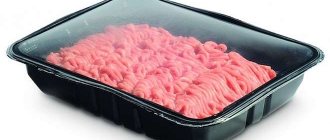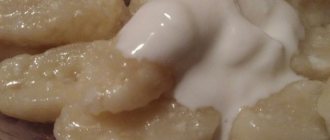Hello everyone, Olga is with you as always, perhaps you will need information on storing food and various things and I will tell you about everything about the timing and methods of storing homemade cottage cheese in the refrigerator. Maybe some details may differ, as was the case with you. Attention, always read the instructions of the things you buy for cleaning the house or the chemicals that help to store them. I answer the simplest questions. Write your questions/wishes and secrets in the comments, and together we will improve and supplement the quality of the material provided.
Cottage cheese has gone bad - how can you tell?
To assess whether a product is spoiled, focus on the following characteristics:
- the smell will be unpleasantly sour, rotten, moldy, bitter, old fat, nauseating;
- taste - bitter, with an extraneous, unpleasant aftertaste;
- appearance - cottage cheese with mucus, sometimes pink, gray, blue, black.
Of course, this has already been described as a critical condition, which is almost impossible not to notice. But even a minimal deviation from the norm in the taste, smell and appearance of homemade cottage cheese is a reason not to eat it!
In general, even the freshest village or farm cottage cheese is unsafe to eat raw. Unless you have your own cow or goat. Well, or you made the cottage cheese yourself (there is an excellent recipe here). And here everyone decides for himself - to take risks, hoping to get the maximum benefit, or to heat-treat the cottage cheese: prepare delicious and healthy dumplings, cottage cheese, casseroles, desserts. Cheesecakes with sour cream or jam, even those made without eggs, will please everyone.
Rules and terms of storage in the refrigerator
The shelf life of homemade cottage cheese in the refrigerator at +1-+7°C is up to 7 days . In this case, the temperature should not change sharply, ensure minimal air access (just close the lid or tie the bag tightly). Otherwise, the product will become weathered, sour, or even moldy.
Do you use expired food for cooking at home?
Yes, the main thing is to process it if it is meat or expired kefir for pancakes.
27.47%
No, it is very dangerous and not useful.
35.14%
If the products have fungus or mold, then we throw them away; if they are a couple of days past their expiration date, we use them for food, even without heat or other treatment.
37.39%
Voted: 2479
Considering how long you can store homemade cottage cheese in the refrigerator, you need to remember about packaging:
- opened cottage cheese can be stored in the refrigerator for no more than 24 hours;
- 1-2 days, if the container is a plastic bag;
- 3 days, there is a plastic, sealed box;
- in an enamel container with a tightly closed lid – 2 days;
- Vacuum packaging will keep food unchanged for up to 10 days.
Rules for defrosting cottage cheese
Defrost food only in the refrigerator by opening the lid of the container and leaving the frozen product for 12 hours. To speed up the process, you can wrap the container with a damp cloth.
There is no need to speed up the process - heating, a microwave, or hot water will further worsen the already faded taste characteristics of defrosted food.
Healthy! You can freeze not only homemade cottage cheese, but also dishes made from it, both ready-made and raw. Cheesecakes and casseroles can be frozen ready-to-eat or those that require not only defrosting, heating, but also baking or frying.
Fermented milk products are important in a balanced diet, and they’re simply delicious. But you need to take into account that they are not stored for a long time, especially homemade ones, that is, the most healthy and natural ones. So, the shelf life of homemade cottage cheese in the refrigerator is not very long - several days. It wouldn’t hurt to figure out how to keep it fresh longer, and how to tell if the cottage cheese has gone bad.
- the smell will be unpleasantly sour, rotten, moldy, bitter, old fat, nauseating;
- taste - bitter, with an extraneous, unpleasant aftertaste;
- appearance - cottage cheese with mucus, sometimes pink, gray, blue, black.
How to prepare this delicacy, and what products are best to use
To prepare cottage cheese casserole you will need dairy products and an oven. Although in the modern world the lack of an oven can be easily compensated for with a multicooker, and some recipes are also designed for a microwave. And absolutely any housewife, both experienced and beginner, can prepare it.
The main ingredients of cottage cheese casseroles are:
• chicken or quail eggs; • cottage cheese of various fat contents; • flour, semolina or starch; • optional filler (jams, preserves, fresh or frozen berries); • dried fruits or nuts.
It is acceptable to use oatmeal in some dietary recipes.
When preparing a casserole with starch, it will resemble a soufflé and have an airy structure. If flour is involved, the result will be a denser consistency. Semolina will be chosen by people who do not adhere to proper nutrition. Before starting cooking, for a more sticky consistency, it is recommended to soak the semolina in milk, warm water or kefir, depending on the original recipe.
What is the calorie content of the finished product and how can you influence it?
Calorie content is the main criterion in choosing the right recipe, especially if you adhere to a healthy or dietary diet. The calories in a dish depend solely on the calorie content of its ingredients. For example, if you use low-fat cottage cheese, such as 3-9%, then its calorie content will be much less than when using 18% cottage cheese. You yourself have the right to control and prepare the casserole exclusively for your body.
How to prepare cottage cheese casserole, easily, quickly and simply? One of the most common recipes for an airy, dietary casserole without semolina is as follows:
• 4 eggs; • 2 tablespoons of starch; • 600 g of cottage cheese with fat content of your choice; • 7 tbsp. l. Sahara; • 2 tbsp. l. sour cream.
Beat cottage cheese, sugar, starch, sour cream and yolks with a mixer until a paste-like consistency, then beat the whites and add to the main mass, stirring with a spoon until smooth. You can add raisins. Line a glass pan with parchment and grease it with butter. Pour in the prepared mixture. Place the pan in a preheated oven at +180°C and bake until golden brown for about 30 minutes. The finished casserole should cool in the oven and can be served; it is delicious both warm and cold. It’s a good idea to use fresh or frozen berries with sugar or jam as a dressing.
How long does cottage cheese casserole last in the refrigerator and without it? After complete cooling, it is customary to store the finished casserole in the refrigerator. The shelf life of the dish depends on the shelf life of the cottage cheese. It is quite possible that after cooking you will not save it, since this dish flies away with a bang.
But shelf life must be taken into account in any case. Cottage cheese products do not last long. Ready-made curd products should be stored in the refrigerator at a temperature of +2...+4 °C. The shelf life of the product in this case will be no more than 24 hours, provided that the purchased cottage cheese was fresh. If you don’t have a refrigerator at hand, the storage time is significantly reduced; you can leave the casserole at room temperature for no more than five hours.
If you still have a freshly prepared casserole, and you need to leave for a few days, you can freeze it in the freezer, but in this case, after defrosting, you need to use it immediately. For any storage method, always check the curd product for smell, because the sense of smell never fails; if the product has deteriorated, it will be characteristic. If there is the slightest unpleasant or sour smell, the casserole should be thrown away without regret.
Cottage cheese casserole is a good choice for health and youth, cook for your health!
If you still have a freshly prepared casserole, and you need to leave for a few days, you can freeze it in the freezer, but in this case, after defrosting, you need to use it immediately. For any storage method, always check the curd product for smell, because the sense of smell never fails; if the product has deteriorated, it will be characteristic. If there is the slightest unpleasant or sour smell, the casserole should be thrown away without regret.
Freezer
Those who like to stock up on food in advance and in large quantities can simply place their favorite delicacy in the freezer.
The shelf life of frozen cottage cheese is quite long and depends on the temperature:
- From 0 to -6°C - the product can be stored for up to 6 days.
- From -12 to -18°C - within two weeks.
- With deep freezing, when the temperature in the freezer reaches -35°C, the shelf life is the longest - 1-2 months.
Before putting the curd in the freezer, you need to transfer it to a plastic food container, first lining the bottom with a paper towel and tightly closing the container with a lid.
The product is defrosted either in the refrigerator for 10-12 hours, or at room temperature for 4-5 hours. After defrosting, the shelf life of cottage cheese in the refrigerator is no more than a day. Under no circumstances should you refreeze the curd.
Fridge
Cottage cheese contains lactic acid bacteria, which require heat to function. At temperatures above 8°C, they begin to multiply quickly, and, accordingly, the curd begins to deteriorate. Therefore, it is advisable to store it at low temperatures.
The optimal storage period for cottage cheese in the refrigerator is two days at a temperature of 2 to 8°C. However, you can store the curd for up to 4 days at 0°C. To do this, just place it in close proximity to the freezer.
Cotton fabric
Cotton fabric is perfect for storing cottage cheese. It is wrapped in a slightly damp cloth and placed in a container that is closed with a lid, and then put in the refrigerator. With this packaging method, the curd does not air out and also maintains the required level of humidity.
Can I keep it in the freezer?
Its shelf life in the refrigerator cannot be compared with its shelf life in the freezer. Temperatures below zero significantly slow down the metabolic rate of the lactobacilli living in cottage cheese, due to which it spoils much more slowly and, therefore, is suitable for consumption for much longer.
Cottage cheese frozen at -35 degrees Celsius immediately after production can remain usable for up to three weeks. During this time, even a small family can eat several kilograms of it - therefore this method is the most optimal if it is necessary to preserve a large volume of it.
Unfortunately, the method also has its drawbacks. Before eating, the curd mass must be properly defrosted - and this process is quite lengthy. If you want to try this dish, it will be impossible to satisfy your desire right away. It can only be defrosted in the refrigerator, which takes ten to twelve hours. When defrosted at room temperature (within 4-5 hours), it loses its structure and taste, and is only suitable for baking or other methods of cooking through heat treatment.
Difference in shelf life
- cottage cheese and curd products are good for 72 hours ;
- heat-treated cottage cheese and products – 5 days ;
- cottage cheese dishes (cheesecakes, dumplings, pies with cottage cheese filling) – 24 hours ;
- casseroles and cottage cheese casseroles – 48 hours ;
- children's cottage cheese - 36 hours .
The shelf life may be increased by the manufacturer. This is acceptable if it uses more advanced processing technologies or new packaging.
To obtain the right to legally indicate deadlines that differ from SaNPiN norms, the manufacturer must contact the SES authorities , justify the possibility of extending the deadlines and present product test results confirming the safety of the product throughout the entire shelf life.
For example, Agusha children's cottage cheese has a shelf life of 14 days .
Most likely, the period has been increased due to modern sealed packaging. Indication of longer periods may also indicate the use of preservatives .
Shelf life and storage rules for cottage cheese and cottage cheese products
Cottage cheese and products made from it contain protein, vitamins, calcium, lactose, carbohydrates and iron. But they are healthy and tasty only when fresh. Today we will talk about how long curd products are good for consumption and how to preserve them “edible” for as long as possible, and is it possible to find a use for them after the expiration, without fear for the health of family members. From the standpoint of the law, cottage cheese and curd products are classified as perishable. This means that after a certain time, they are considered spoiled and cannot be eaten.
You can learn about the standards that must be followed in order not to cause harm to health from three documents:
- TTI GOST R 52096-008 “Cottage cheese”.
- San PiN 2.3.2 1324-03 “Hygienic requirements for shelf life and storage conditions.”
- GOST R 52096-2003 “Cottage cheese. Technical conditions".
Clause 8.2 of GOST R 52096-2003 determines that the manufacturer can independently set the shelf life of cottage cheese and products made from it.
The manufacturer is invited to decide for himself which product to indicate on the packaging, based on the type and composition of the product. How does the storage capacity of cottage cheese affect the shelf life? The shelf life of all perishable products is specified in San PiN 2.3.2 1324-03.
The section dedicated to it specifies how many hours or days a particular product can be stored at air temperatures from -2 to +4 degrees
How to store at home: conditions, place, container and timing
In ancient times, in villages, cottage cheese was stored in special cellars, wrapped in white linen cloth dipped in water.
Everyone knows about the benefits of cottage cheese, but this valuable product is perishable. A fermentation process is constantly occurring in its living substance.
Dairy plants use special preservatives to prolong shelf life. In order to purchase a quality product, and so that cottage cheese does not lose its beneficial properties ahead of time, it is important to know the parameters and expiration dates of this fermented milk product.
How long does cottage cheese casserole last?
If it turns out delicious, then the cottage cheese casserole can be stored only for the time necessary to eat it. But seriously, nothing can happen in the refrigerator in a day, you just need to protect it from drying out with cling film, and in a special container (for example, with a vacuum) it can be stored for up to three days.
I cook cottage cheese casserole quite often, my child loves to enjoy this dish.
Usually there is nothing left; this kind of casserole goes off with a bang, especially if I add raisins and candied fruits. Yes, and I cook it just right so that there is nothing left.
But if you suddenly have some casserole left over, you can’t store it for a long time; it’s a short-storage product.
Without a refrigerator, I would not risk storing this dish at all, but it is better to store it in the refrigerator for no more than 24 hours; it would be good to wrap the casserole in cling film and store it that way.
If you have not eaten the cottage cheese casserole within 24 hours, it is better to throw it away.
The casserole is made from cottage cheese, and it is very easy to get poisoned with it, and there have even been cases where people were taken to hospitals. It is better to make the casserole and eat it right away, and not store it at room temperature. However, if left out of the refrigerator for a day, it may spoil because it can only be stored for a few hours. If you put it in the refrigerator, then it’s good; in the cold, the casserole can be stored at a temperature of 2-4 degrees for no more than 48 hours. I’m not talking about a store-bought casserole, where it’s unclear what’s in the ingredients for longer preservation; my answer is about a casserole that housewives prepare themselves.
Cottage cheese casserole is a product that has a very short shelf life.
Without a refrigerator, cottage cheese casserole can be stored for no more than two hours; if it is in the summer, then in general it is better not to leave this dish without a refrigerator.
The cottage cheese casserole should be stored in the refrigerator for no more than a day.
The shelf life of fresh dairy and lactic acid products, including cottage cheese, as well as dishes prepared from it, is quite limited, since these products quickly become spoiled, and the symptoms and course of poisoning with them are very severe.
Therefore, you should not take risks and initially try to prepare as much cottage cheese casserole as the family can eat at one time.
If there is still some casserole left, it should be immediately placed in the container in the refrigerator, covered with film or a lid so that it does not oxidize. Do not cover the film and lid very carefully; let the casserole “breathe.”
We store it for no more than a day and then mercilessly throw it away.
Cottage cheese casserole is made from cottage cheese; sometimes semolina is added to the recipe. All products are quite perishable. You especially need to consider the freshness of the cottage cheese that you use when preparing the casserole. Without refrigeration, it can be stored for no more than two hours. This time is enough to get to work and put it in the refrigerator if you took it with you for breakfast. In general, storing casserole in the refrigerator is better not to exceed 24 days, well, I stored it for a day and ate it the next day during the day. About purchased casserole is a separate conversation, since you did not put the products in, it is better to look at the shelf life of the packs declared by the manufacturer.
I cook cottage cheese casserole quite often, my child loves to enjoy this dish.
How to freeze and defrost correctly
For freezing to be effective, you should follow simple rules:
- Freeze freshly purchased food.
- The temperature in the freezer should not be less than -18 °C.
- To avoid chapping, place the product in a hermetically sealed container or tight bag.
- Package the cottage cheese in single serving portions.
- For convenience, mark the start date of freezing on the packaging.
Can I put it in the freezer and how long can I keep it frozen?
It is important to remember that when frozen, cottage cheese loses almost a third of its valuable qualities, but this does not affect the taste. To store cottage cheese in the freezer, first place it in portions in sealed bags or food containers, this will ensure insulation from air and foreign odors.
A product that has previously been stored in the refrigerator for no more than 72 hours is frozen. You can store cottage cheese in the freezer at a temperature of -18 °C for one to two months. If the temperature in the chamber is from 0 to -15 °C, then frozen semi-finished curd products are stored for up to 2 weeks. Cottage cheese-based dishes are also frozen.
To use frozen cottage cheese, first defrost it for about 5 hours in the refrigerator and then at room temperature.
Cottage cheese cannot be frozen several times, since if it is re-frozen, all valuable properties will be lost.
In addition to vitamins and carbohydrates, dairy products contain fats, proteins and a lot of moisture. They provide a breeding ground for the development of bacteria that enter the milk during milking. On our website you will find complete information about the shelf life and storage of dairy and fermented milk products: yogurt, butter, milk powder, ice cream, condensed milk, sour cream and kefir.
Safety of home products
Everything said earlier applies to curd products produced industrially in accordance with GOST. And if you prefer to make homemade cottage cheese by weight?
This delicacy can be stored for no more than 12 hours at a temperature of 15-20 °C . It is advisable to wrap it in clean cotton or linen cloth soaked in cold water, as was done in the old days. You can keep the homemade product in the refrigerator for up to 2 days .
Try to evaluate the quality of cottage cheese before purchasing: a fresh product should have a pleasant sour-milk smell and taste, an even color without spots or inclusions.
How to determine that cottage cheese is spoiled and what to do
Important! The “farm” origin of cottage cheese does not at all guarantee its safety.
When purchasing a homemade product, a person has no way to check the date of manufacture. Milk that has not been sterilized is most vulnerable to spoilage.
When determining the condition of a product, it is dangerous to rely only on its smell and taste. A sour aroma and bitter taste indicate that the decomposition process of the product has already gone far.
After a couple of days of storage, the cottage cheese begins to lose its freshness and usefulness. The best way to dispose of a large amount of stale product is to use it to make dumplings, cheesecakes or any other type of baked goods.
How long can you store cottage cheese casserole in the refrigerator?
If cottage cheese is stored longer, there may be various negative consequences. This must always be taken into account. But there is also an opinion that the shelf life of cheesecakes can reach up to a week.
However, this is all at the person’s own risk.
Therefore, you need to be extremely careful here. Some confidently claim that even cottage cheese that can no longer be consumed fresh can be used for cheesecakes, as well as casseroles (or some other hot processing).
How long will it stay fresh in the refrigerator?
This fermented milk product is obtained by separating milk protein from whey. The process is directly related to milk peroxidation - it is produced by lactic bacteria contained in the liquid, which separate the milk into fractions.
Bacteria continue their vital activity in the finished cottage cheese, so it has an extremely limited shelf life. Without a refrigeration chamber, it can remain fresh for no more than a day (and at temperatures above 15 degrees Celsius - only a few hours).
Fortunately, there is a refrigeration unit in every equipped kitchen, so those who like to try this product should not have any problems. Experts in the field of food technology claim that in such conditions it remains fresh for no more than two days.
It is worth noting that children’s immunity and digestive system are much weaker than those of an adult, so it is highly advisable to give children only fresh cottage cheese that has been in the refrigerator for no more than a day.
Find out how to store dried apples here.
However, it is worth noting that there are many ways to extend the life of this product by two to three days or even a week. Buying it every day may not be part of the plans of its lover - many modern inhabitants prefer to make massive purchases and are not used to making exceptions even for perishable food. The ways in which pleasure can be seriously extended should be described in more detail.
What determines how long a product will be stored in the refrigerator?
Would you like to know what determines the shelf life of this valuable product? These are the following factors:
- Heat treatment method. Factory-made cottage cheese is stored the longest, for the production of which special heat treatment technologies were used.
- Storage temperature. It should be within 2-6 °C, and the optimal temperature for long-term storage cottage cheese is -18 °C. The lower the temperature, the longer its freshness and beneficial properties are preserved.
- Package. Curd products are stored in vacuum packaging for a long time - up to 30 days.
- Fat content. Low-fat 2-5% cottage cheese, which is made from skim milk, has the longest shelf life. 9% half-fat cottage cheese, which is prepared from whole and skim milk, is saved a little less. And a product with a high percentage of fat content (18% or more) has a very short shelf life.
- Air humidity. To keep the cottage cheese fresh longer, air humidity of 30-45% is required.











